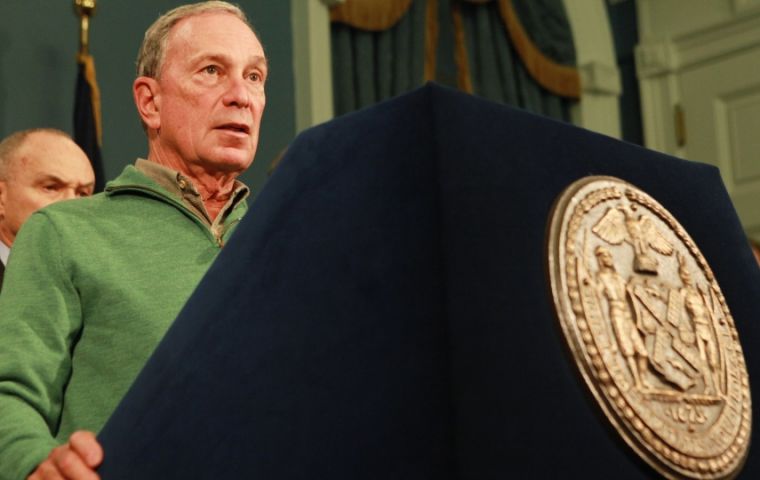MercoPress. South Atlantic News Agency
Gasoline rationing extended in New York until next Friday
 Mayor Bloomberg said 30% of gas stations remained closed because of the damages caused by hurricane Sandy.
Mayor Bloomberg said 30% of gas stations remained closed because of the damages caused by hurricane Sandy. Gasoline rationing in New York City which was scheduled to end on Monday has been extended through Friday, even as the gas station lines that prompted it have all but disappeared.
In announcing the decision, Mayor Michael Bloomberg noted the major travel week ahead at a time when 30% of gas stations remained closed because of the damages caused by hurricane Sandy.
In a statement, Bloomberg said that he was extending the rationing “to ensure we do not risk going back to the extreme lines we saw prior to the system being implemented”.
The 2012 version of gas rationing has been much less painful than the last time it was imposed in the whole of the United States amid the fuel shortages of the 1970s. Back then, rationing measures -- including odd-even, which restricts gas sales to cars with odd-numbered license plates on odd days and even-numbered license plates on even days -- stretched on for months and seemed to barely make a dent in the problem.
This time Hurricane Sandy created a temporary glitch in the regional supply line by cutting off power to gas stations and damaging a distribution network of ports and terminals that delivered gas to the pumps. They said that it should have been only a minor disruption because power was restored to stations and terminals were repaired. But it soon evolved into a crisis in part when drivers who were not used to being told they could not fill up when they wanted began to panic and started descending upon gas stations in droves.
“By perceiving a shortage, they actually created one,” said Awi Federgruen, a management professor at Columbia Business School.
Federgruen added that gas station owners who responded with their own form of ad hoc rationing -- such as setting a limit of 10 gallons per customer -- only reinforced the feeling that there was, in fact, a limited supply of fuel. That, he said, ultimately contributed to the long lines by forcing customers to come back for more gas and “doubling or tripling the volume of cars that need to be served.”




Top Comments
Disclaimer & comment rules-

-

-

Read all commentsTakes a darn MONTH in the mighty USA to get some stupid trees and powerlines up so gasoline can be restored?
Nov 19th, 2012 - 05:07 pm 0I saw some pictures of the “megastorm”... we get as many trees down and fires in Mendoza during a stupid Zonda event. Talk about a country in decline, I bet in the 1950s they would have fixed all that in a week.
Tens of thousands of trees came down during the hurricane. A rare event in the area it hit. Like the 1987 hurricane in England, these rare events cause much destruction because they are so rare.
Nov 19th, 2012 - 05:41 pm 0Are there even that many trees in Mendoza? (Not including the cultivated fruit trees).
Unlike you, TTT, I have travelled extensively in Argentina and the US. There is no comparison. Argentina is a beautiful country but has been underdeveloped, underfunded and neglected for decades. Despite your wish that Argentina is somehow on the rise and the US on the fall, it certainly does not look that way. You should get out in the world and see for yourself. It might widen your narrow mind.
What are you talking about? Did I say anything about Argentina? Aren't you the one always bleeting to stick to topic. Well dearess, the topic here AINT Argentina. Stick to the program unless you are the typical British behavior of “do as we say not as we do”.
Nov 19th, 2012 - 05:48 pm 0There's millions of trees in Mendoza, and all are artificially planted. How about that.
You are talking about tens of thousands of trees over an area the size of the east coast of Buenos Aires province, not all in one little area. Furthermore that region of the world has a massive population density, so the man power is there. And since you just said how superior the USA is supposedly, you would think they would have the equipment ready to go.
No, there is no excuse for it to take a month to just axe through some trees with electric serruchos.
I give a slark how much you've travelled, I still will place my opinion and furthermore your opinions on Argentina are biased and in the real world of journalism and research no one would take them seriously unless it was a pro/con document, where two opposing sides were highlighted.
Commenting for this story is now closed.
If you have a Facebook account, become a fan and comment on our Facebook Page!